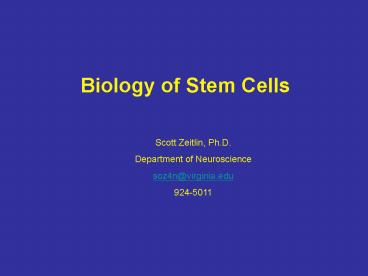Biology of Stem Cells PowerPoint PPT Presentation
1 / 39
Title: Biology of Stem Cells
1
Biology of Stem Cells
Scott Zeitlin, Ph.D. Department of
Neuroscience soz4n_at_virginia.edu 924-5011
2
Neuronal Stem Cells
- Multipotent self-renewing progenitor cells
- CNS neurons, astrocytes, oligodendrocytes
- PNS neurons, Schwann cells, neural crest
derivatives (smooth muscle cells)
3
Gage review, Science 2000
4
(No Transcript)
5
(No Transcript)
6
Mouse ES cells growing on a layer of primary
fibroblasts
7
ES cells maintenance of the undifferentiated
phenotype
JAK kinase
Y
Y
Y
STAT3
8
Neuronal differentiation of ES cells
- Remove LIF, culture as embryoid bodies, then
treat with RA - Grow in defined medium supplemented with FGF2,
followed by withdrawal from FGF2 and plating on a
laminin-coated substrate - Grow in the presence of Shh and FGF8 (generates
predominantly dopaminergic neurons)
9
ES cells grown in suspension form embryoid bodies
that recapitulate early embryonic development
Day 4
Day 10
10
Neuronal differentiation of ES cells
- Grow ES cells at low density in defined medium on
a non-adhering substrate - Grow ES cells at low density in defined medium in
the presence of LIF
11
Neuronal differentiation a default state for ES
cells?
Tropepe et al. Neuron 3065-78 (2001)
12
ES cell derived neural sphere colonies
differentiate into neurons and glia and can
contribute extensively in mouse chimeras
Tropepe et al. Neuron 3065-78 (2001)
13
Neurogenesis in the adult songbird
brain(Goldman, S.A. and Nottebohm, F. PNAS
802390-94 1983)
- Occurs within an area of the dorsomediocaudal
neostriatum involved in song learning the HVC
(Higher Vocal Center) - New neurons are generated in the
ventricular/subventricular zone and migrate into
the forebrain where they differentiate into
functional neurons (both projection and
interneurons) - The adult canary HVC recruits over 1.4 of its
neurons daily. Hormones regulate this process - Avian radial glial cells may be the progenitor
cells for both radial glia and neurons
14
Goldman S.A., J. Neurobiol. 1998 267-86.
15
Garcia-Verdugo et al., J. Neurobiol. 36 234-48
(1998)
16
SVZ markers
- Musashi 1 (RNA binding protein)
- Nestin (intermediate filament protein)
- PSA-NCAM (cell adhesion)
- Vimentin (intermediate filament protein)
- Tenascin (extracellular matrix protein)
- GFAP (glial fibrillary acidic protein)
- TGFa?(growth factor)
- IGF-1 (growth factor)
- EGF-R (growth factor receptor)
- TrkB (growth factor receptor)
- TuJ1 (neuronal marker)
17
IHC with anti-PSA-NCAM Ab
Garcia-Verdugo et al., J. Neurobiol. 36 234-48
(1998)
18
Differentiated outgrowths from a neurosphere
RedTuJ1
GreenGFAP
Svendsen et al., J. Neurosci. Meth. 85 (1998)
141-52
19
(No Transcript)
20
Svendsen et al., J. Neurosci. Meth. 85 (1998)
141-52
21
Identity of the stem cell in the adult SVZ
22
Stem cells observed in situ in the adult rodent
brain
F. Gage, Science 287, 2000
23
Ependymal cells are stem cells?
24
GFAP
bIII-tub
neurosphere
O4
ciliated ependymal cell
BrdU
25
Transplantation into hippocampus
Transplantation into the rostral migratory stream
From Suhonen et al., Nature 383, 624 (1996)
26
Isolation of endogenously proliferating cells
from the adult rat brain Palmer et al., J.
Neurosci. 198487-8497 1999
27
The influence of FGF-2 on adult NSCs
Palmer et al. J. Neurosci.198487-97 (1999)
28
Notch/delta signaling in NSCs
Notch 2 and DG
Notch 1 and 2 mRNAs are present in the adult
germinal zones Notch 1 is also expressed in
neurospheres Irvin, D.K. et al. J. Comp. Neurol.
436167-181 (2001)
Notch 1 and the SVZ
29
NSCs express Notch receptors and variable levels
of delta ligand
Undiff.
Undiff.
Undiff.
delta ligand
Notch receptor
30
Activation of Notch receptors in neighboring
cells induces a signal transduction casacade
either maintaining the cells in the
undifferentiated state or inducing gliogenesis
Undiff.
Undiff. or glial
neuronal
delta ligand
Notch receptor
31
FGFs (directly or indirectly) active Notch signal
transduction in neurosphere cultures resulting in
maintenance of the undifferentiated state
Undiff.
Undiff.
delta ligand
Notch receptor
FGFR
FGF
32
Noggin expression in the subependymal cells may
help maintain a population of neuronal stem cells
in the SVZ
Lim et al. (2000) Neuron 28 713-726
33
PNAloHSAhi adult NSCs expanded in vitro can give
rise to neurons, astrocytes, oligodendrocytes,
and muscle cells upon differentiation. Rietze et
al., Nature 412736-9 2001
neurosphere
34
Prospective isolation of human NSCs
- Prepare a single cell suspension of human fetal
spinal cord or brain tissue - Stain cells with an antibody to CD133, a
transmembrane protein that is found on human
hematopoietic stem cells - Enrich for CD133 cells by FACS
- Expand in neurosphere culture
Uchida, N. et al. PNAS 9714720-14725 (2000)
35
Uchida, N. et al. PNAS 9714720-14725 (2000)
36
Transplantation of purified HNSCs into the
lateral ventricles of SCID mice (analyzed 7
months after engraftment)
HNA
Ki-67
HNAKi-67GFAP
HNATH
H-NCAM
HNA?uJ1
Uchida, N. et al. PNAS 9714720-14725 (2000)
37
hNSCs injected into the embryonic monkey brain
LVs migrate from the VZ into the developing
neocortex. Brownvimentin (radial
glia) BlackBrdU labeled nuclei of hNSC-derived
cells Ourednik V et al. Science 2931820-24
(2001)
38
hNSCs injected into the lateral ventricles of the
developing monkey brain segregate into two
populations (1) differentiated cells and (2)
cells colonizing adult germinal zones that retain
progenitor cell characteristics
39
- Papers for discussion
- E. Gould, N. Vail, M. Wagers, and C.G. Gross
(2001) Adult-generated hippocampal and
neocortical neurons in macaques have a transient
existence. PNAS 9810910-10917. - D.R. Kornack and P. Rakic (2001) Cell
proliferation without neurogenesis in adult
primate neocortex. Science 294 2127-2130. - P. Rakic (2002) Adult neurogenesis in mammals an
identity crisis. J. Neurosci. 22 614-618. - E. Gould and C.G. Gross (2002) Neurogenesis in
adult mammals some progress and problems. J.
Neurosci. 22 619-623.
http//hsc.virginia.edu/medicine/basic-sci/neurosc
i/zeitlin.htm

